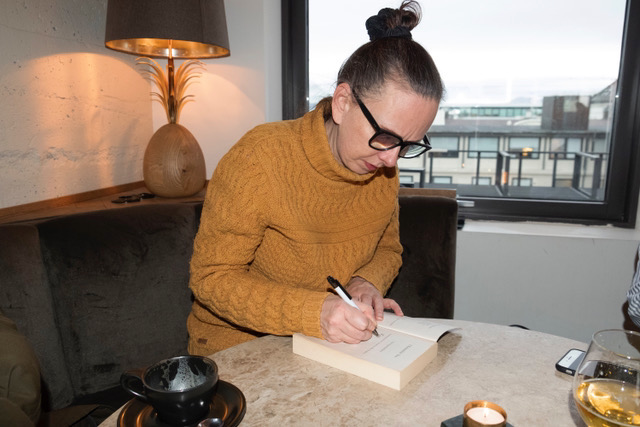Yrsa Sigurdardottir interview. With the support of Avis Iceland.
Pictures by Guðný Hilmarsdóttir.
También la entrevista a Yrsa en español.
This interview is part of the project La Contra Islandia that connects Icelandic and Spanish cultures.
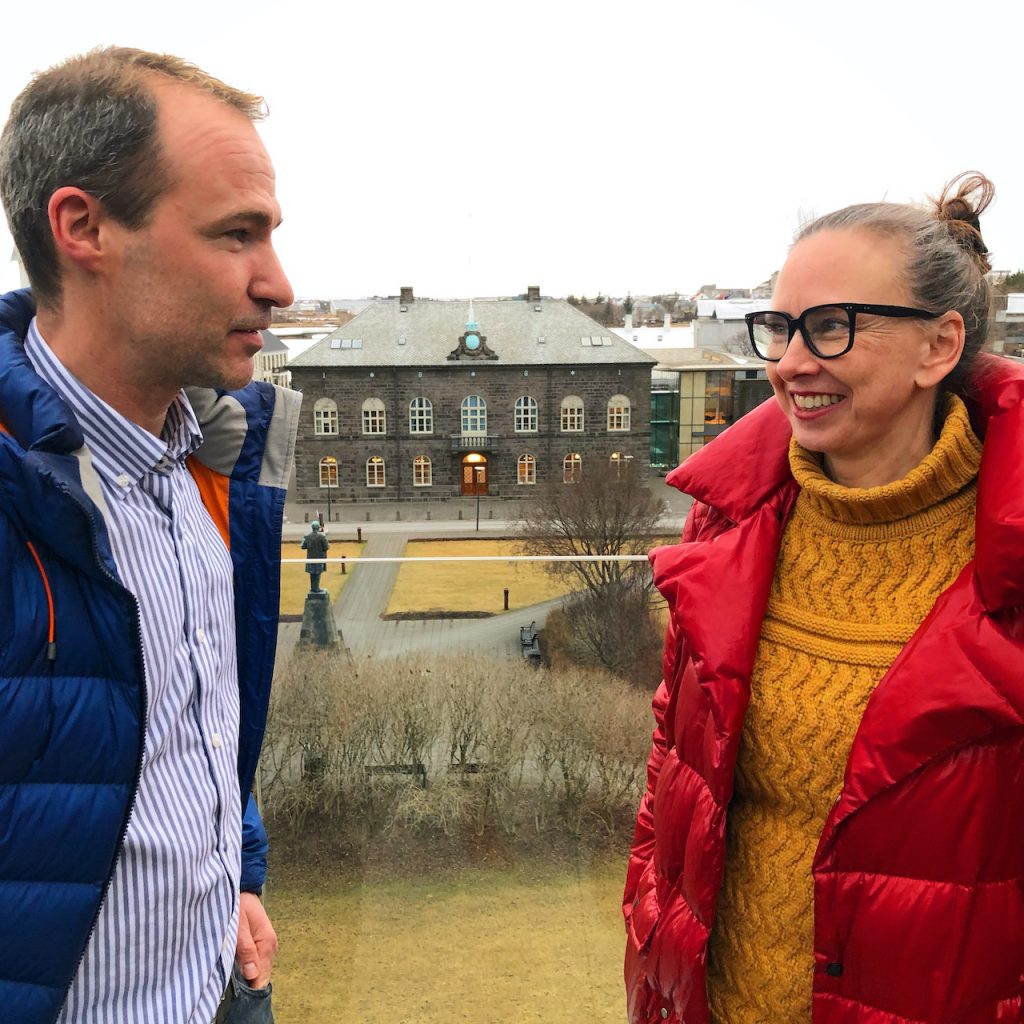
Icelandic Noir
Yrsa is the queen of the so-called Icelandic Noir, a successful generation of Icelandic crime fiction writers.
Don’t you know Yrsa yet?
I think writing crime novels is as difficult as performing magic tricks. Every time you lay your cards on the table (you introduce the characters) and challenge the audience (the reader), you risk having your trick caught (they unmasked the killer).
I ask Yrsa:
When you read crime novels, do you usually find out who is the killer before the end?
Not always, it is much harder to figure out who is the bad guy/lady in crime novels than in movies. There is so much more space to hide things in books and be subtle.
Yrsa won, among other crime novel awards, the Petrona (Scandinavia), Blood Drop (Iceland) and the Danish Academy Award.
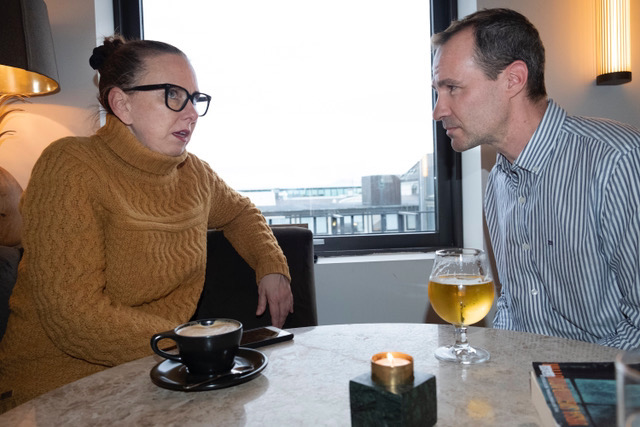
Woman as a main character
She has also retired the intrepid lawyer Thóra (a single mother with two children) and has started a new series with the psychiatrist Freyja and policeman Huldar. Her main characters are usually women. Talking of movies, she tells me she likes movies with a balance between men and women. I don´t like movies with 8 bank robbers and a girl for the poster.
I ask him if the transition was very hard. We had all grown fond of Thóra. She says no:
When you have been with the same character for a long time, you have to constantly make him evolve, or you change him. I went for the second option. It is difficult to keep an evolving character interesting for a long time.
Self-taught, versatile writer (children’s, crime´s and horror´s books) and civil engineer working on something very appropriate in Iceland: geothermal power plants for Verkís.
Under the volcano
Wednesday 3 March 2021.
It was the day the specialists agreed that the Reykjanes volcano was going to erupt. In the streets of Reykjavik, just 50 km away, an apparent calm reigned.
In Iceland there are two types of people: those who rush to the road to see the volcano and those who escape in the opposite direction.
Yrsa was only bothered by the earthquakes, we have been suffering thousands during these last days. They are uncomfortable, she says.
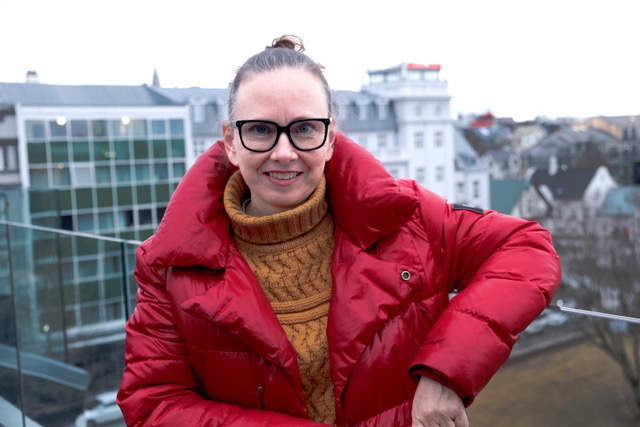
Are you afraid of an imminent eruption?
No, but I´m worried for all the investment in this location. It could cause a lot of damage on the Reykjanes Peninsula. For example: the international airport, the Blue Lagoon, the power plants…
By the way, if you like volcanoes, I recommend the novel Ashes to Dust by Yrsa.
Yrsa Sigurdardottir interview, Iceland Covid free
One of the evident signs that normality has returned to Iceland after the pandemic is that people trust people again. It was a pleasant surprise when Yrsa and her husband Óli greeted us (I was with my photographer) with a high-five as in the old days. Besides, it was a gesture that shows their simplicity and courtesy.
Humour and irony
At first glance you can tell that Yrsa is a cheerful person. She has a contagious laugh, but when you ask her a question, she concentrates and tries to give you the most honest possible answer.
Why is there always humour in your books?
Well, I´ve always been happy and I like funny. But it´s very difficult to not go over the top when you are writing something scary. Funny and scary are not a good couple.
Another characteristic of your novels is irony, do you think it is something associated with Icelandic culture?
Yes, but I think it comes from the UK (through sit comes, TV joke programs…) but I don´t think it comes from the old Icelandic humour because it´s really bad, there is no irony, ridiculous word play jokes, not good at all.

What is the best thing about Iceland?
The nature, our extreme luck to have a lot of this green energy and that we are so small, closed community, you know your relatives, the friends you met when you were kids…
What is it like to be a famous writer in Iceland?
It´s Ok.
Do people recognise you on the street?
Yes, they do. They think they know you, but of course they don´t.
Authors are quite prominent in Iceland because during the Christmas book sells we are on TV, we are on interviews… the Icelandic public is much more likely to recognise an author on the street than it would be in other places.
But the Icelanders are not very impressed by famous people?
No, the reason is because we all go to the same schools; everybody here knows that being famous doesn´t make you more fantastic than you were before. Life is more normal here, no matter who you are.
Are Icelanders cold and shy?
I would think not, but I am sure that in comparison to people from Barcelona we would be cold, but we don´t realize it.
Let me tell you a story. My daughter, when she was 13, she went to the UK, to an English school, just for a month, then when she came back, we went to pick her up at the airport and she was crying and crying. We asked her what happened, what was wrong and then she said she had met Spanish kids at school and she was so sad to have to say good bye to them, she said they were so much more kind, fun and open.
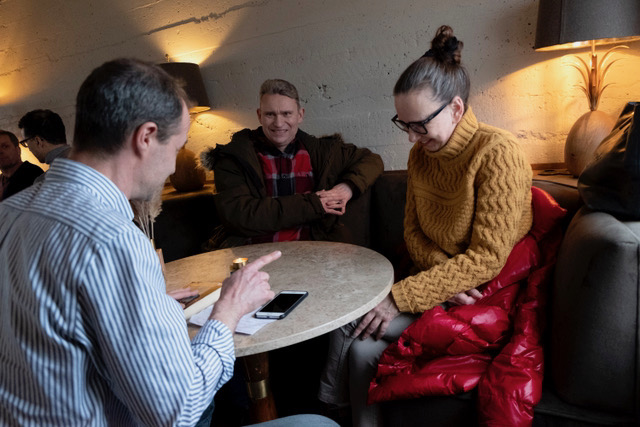
Meeting in a secret club
Before the interview I asked her where she wanted to meet. He told me: at the Vinnustofa Kjarvals Club. It is a private club. There is no sign on the door. I’ll give you a code so you can get in. Wow, that adds more suspense to the interview, I thought. Like in one of Yrsa’s crime novels.
Anyway, we met at the gate and went up to the top floor. A security guard asked for identification and we went in. It is a rectangular room with a bar in the middle and two terraces with stunning views. Modern style, jazz music in the background and beautiful people.
Yrsa Sigurdardottir interview
Why do you still work as an engineer if you can make a living from writing?
Because it´s a job I like a lot, although I don´t work full time any more.
Writing is a lonely job and working as an engineer keeps me connected to the outside world. I work in teams with a lot of people and gives me social interaction. For example, the chatting at the coffee machine… And it´s very nice to work on projects where the result does not depend only on one person. Consequently, I don’t think I could never give it up.
Do you sell more in Iceland or abroad?
I sell much more abroad. Book´s sells in Iceland are really not enough to make a living, but if you sell abroad it´s a whole different story (her books have been translated into 30 languages, including Spanish)
What are Yrsa Sigurdardottir’s tricks?
Writing a novel is a kind of engineering process. Do you plan everything before you start writing?
No. I know the beginning and the ending, I know who is who and why and the direction I´m going to take but I don´t plan anything else.
And do you have a set schedule for writing?
No, I write at any time of the day.
How did you learn to write?
By reading, as soon as I learn to read I have been reading. You understand what writing is about by reading.
From children’s books to horror novels
How did you start?
I started with children’s books. When my son was 9 years old I was worry he was not reading very much, so I took a look at the books that worked on children at that time and they were too didactic, like teaching them a lesson, not the kind of book I had thought he would be interested in reading, so I decided to write a child´s book for kids like him. Then I wrote 5 books for children and won the Icelandic children´s book award (Biobörn 2003), but in some point I became tired and stopped and went back to be an engineer.
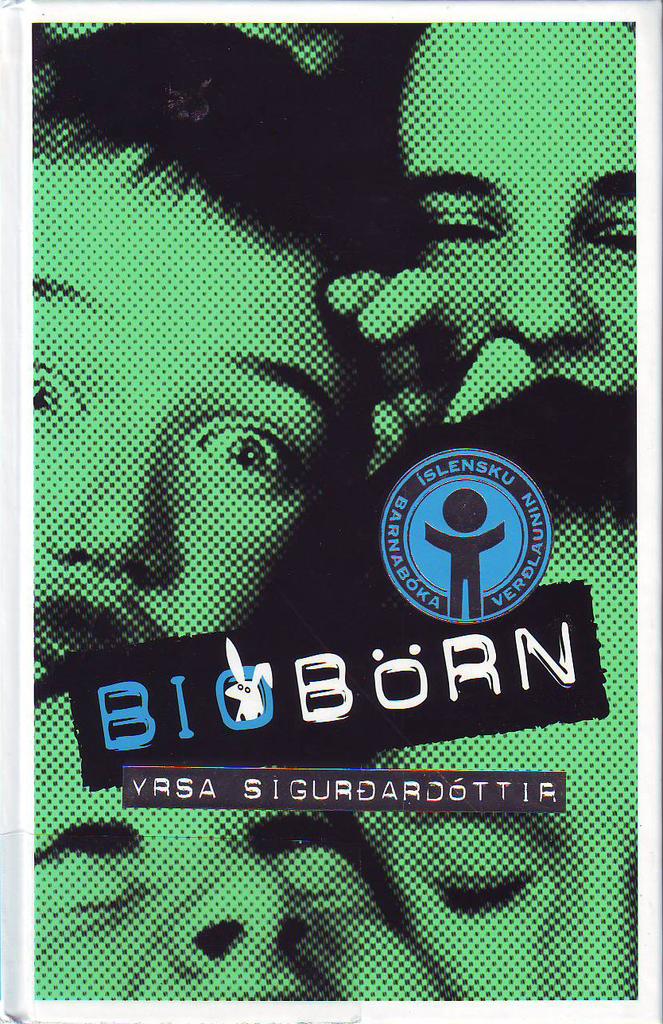
Yrsa Sigurdardottir interview
Two years later I thought I wanted to continue writing, this time for grown-ups. When you write for children there are subjects you cannot discuss and the choice to write crime was very easy because it´s what I like to read. I think every author writes the book he would like to be reading.
And you’ve also written horror novels. For example, I remember you, where did you get the idea?
That came when we were renovating our house. I was so sick and tired of renovation that I used the idea for writing a novel.
Where you renovating a house on the West Fjords?
No, it was in Reykjavik (laughs). But I wanted to write a ghost story and when we went to Hesteyri I found it was the perfect location: there was no telephone, no electricity, anyone to ask for help… I think a ghost story in a city is not appropriate, you need to feel isolation, very scary, that your safety is gone.
She tells me she is pleased with the film version of the novel.
The weather in Iceland is another character in your novels.
The weather is a common denominator in all your stories, why?
To write a good novel you need credible characters, a good story line… but you also need to make the environment come alive and part of what makes atmosphere, makes the environment, particularly in Iceland, is the weather, it is a big part of everything, because it changes constantly and you never plan anything.
What is your favourite place in Iceland?
Vestamannaeyjar, we have some very good friends and we go a lot.
Why?
Because it reminds me to Hafnarfjörður, where I grew up, the way it was before, a fishing community.
Who are your favourite authors?
Stephen King (early books), Agatha Christie, Charles Dickens, Sophie Hannah and, in Iceland, Ragnar Jónasson, Eva Bjork Aegisdóttir… So, all kinds. But I don´t read while I’m writing.
Yrsa Sigurdardottir the interview
Why not?
I´m worry that my writing might be influenced by what I´m reading.
I always remember the Icelandic National Bridge team. They said they practised before the championship by not playing and they became world champions.
And if you are writing a novel for 6 months, don’t you read anything in 6 months?
I just don’t write every day. I can take a week break and then I read something.
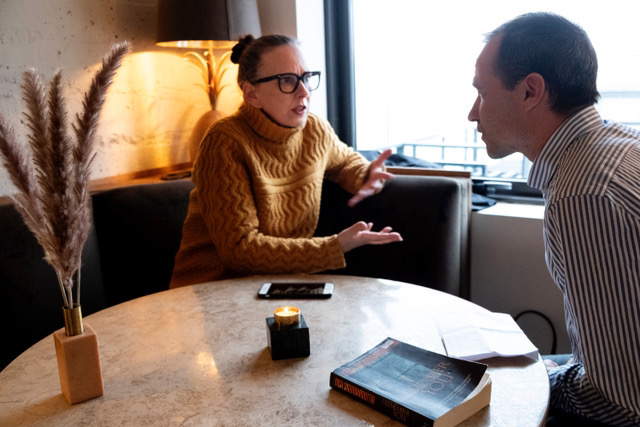
What are your hobbies?
Basically, reading and swimming in the ocean. But not in the Icelandic cold waters, only abroad.
Do you read paper or electronic books?
Paper books, I know that electronic has many advantages but I haven’t taken the plunge yet.
Yrsa Sigurdardottir in Spain
What is your experience in Spain?
I know you were at the BCNegra Festival (2020) with Eliza Reid (read the interview), the First Lady.
The experience was fantastic. And it was the last trip I made for books and then the Covid came. I’ve been to Barcelona three times, two to this festival and one on my own. I really like it, it´s a great place.
I have seen huge changes in La Sagrada Familia building by Gaudi. The first time I went, almost 20 years ago, you went inside and if I remember correctly there was no roof, it was open, only walls. And now it´s beautiful, crazy nice.
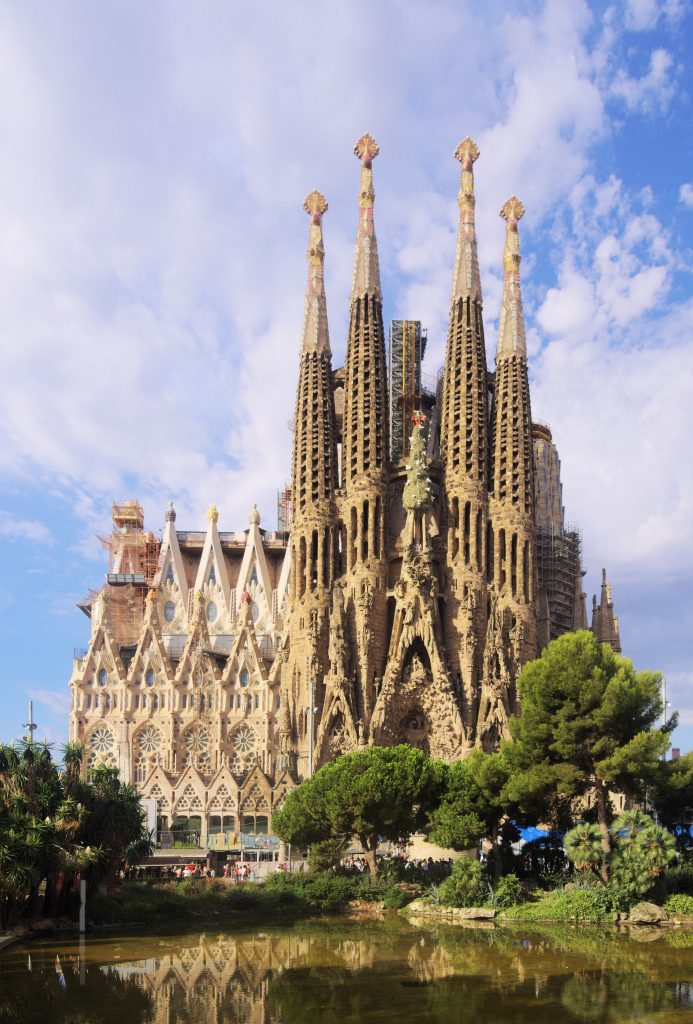
What other parts of Spain have you been to?
Madrid, Bilbao, Granada (we really liked the Alhambra) and Torrevieja, but we went there only to visit friends, it was hot and very touristy, so we rented a car and drove away to see something.
What do you like of Spain?
The food, the weather, the vibrancy of life: that you close in the afternoon for siesta, I think it is a great think.
Do you like Spanish wine?
I do. Very much. I like Spanish and Italian wines because they offer much more than the French for your money.
Do you want to add anything?
I would have liked to learn Spanish as a third language, but there were only two options: French or German. I think that would have been very useful for me, it´s a huge language. My daughter learnt Spanish.
What kind of movies you like?
I like movies from South Korea.
And in general, I am a big fan of horror movies, i.e. the good ones not the stupid ones. But the last movie I watched and was very pleased with was Japanese movie “One cut of the dead”. It starts off being the worst movie you have ever seen and then becomes a masterpiece in surprise scriptwriting. The less one knows about it before watching, the better.
I am not a fan of romance movies or movies about someone dying of cancer or movies about bank heists. I do not like vampire movies either. They are usually romance movies disguised as horror.
And Spanish?
I was very touched by Pan’s Labyrinth which is Spanish-Mexican. I also liked Women on the Verge of a Nervous Breakdown by Almodóvar, as well as Volver and Invisible Guardian based on the book by Dolores Redondo. And of course, Rec and the Orphanage.
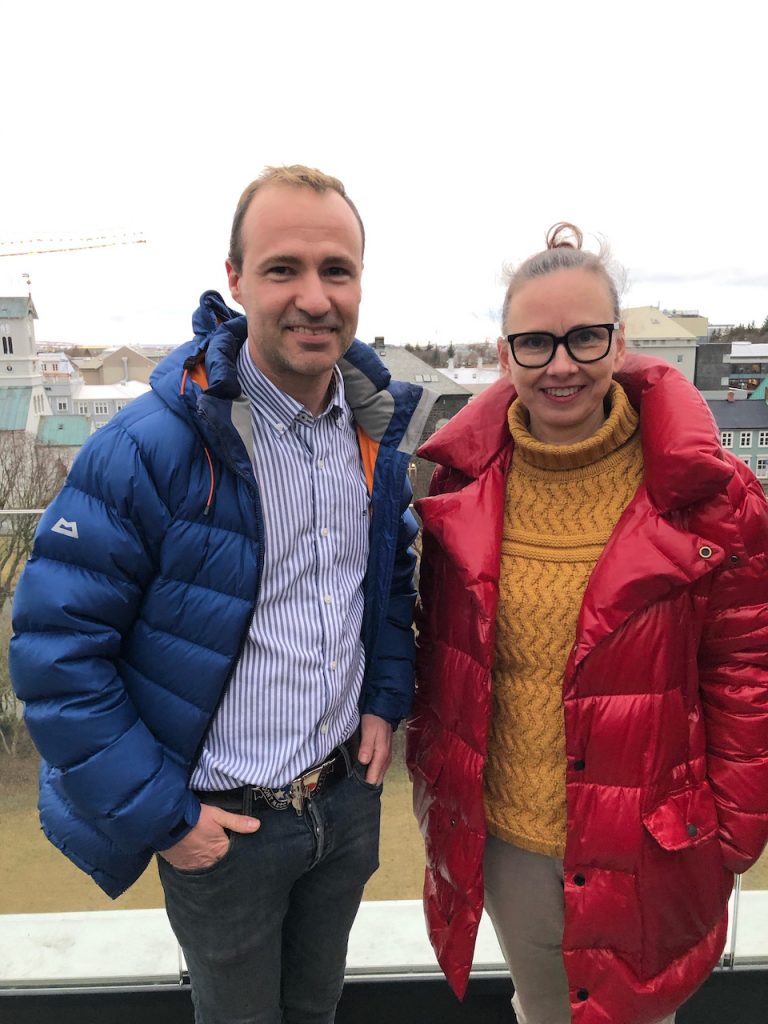
About TV serials, which are your favourite?
My favourite TV series of all time is Breaking Bad. I also quite like Criminal, the Netflix series that takes place in an interview room and is set in various countries. Finally, my recent favourite is the Norwegian show Exit, about four rich investors. It makes you want to throw up a little bit and you hope that all the main four characters all die, but there is something addictive in watching the sad lives of their wives and girlfriends.
And Game of Thrones?
Game of Thrones is a series that I have not seen yet. It is definitely on my to-be-watched list.
Yrsa Sigurdardottir interview, bibliography (Wikipedia)
Children’s fiction
- Þar lágu Danir í því (1998)
- Við viljum jólin í júlí (1999)
- Barnapíubófinn, Búkolla og bókarræninginn (2000)
- B 10 (2001)
- Biobörn (2003)
Crime novels
Thóra Gudmundsdóttir series
- Þriðja táknið (2005), (English translation by Bernard Scudder: Last Rituals, US:2007, UK:2008)
- Sér grefur gröf (2006) (English translation by Bernard Scudder and Anna Yates: My Soul to Take, 2009)
- Aska (2007) (English translation by Philip Roughton, Ashes to Dust, UK:2010)
- Auðnin (2008) (Veins of Ice) (English translation by Philip Roughton, The Day is Dark, UK:2011)
- Horfðu á mig (2009) (English translation by Philip Roughton, Someone To Watch Over Me, UK:2013)
- Brakið (2011) (English translation by Victoria Cribb, The Silence of the Sea, UK:2014)
Freyja & Huldar (Children’s House) series
- DNA (2014) (English translation by Victoria Cribb, The Legacy, UK:2017)
- Sogið (2015) (English translation by Victoria Cribb, The Reckoning, UK:2018)
- Aflausn (2016) (English translation by Victoria Cribb, The Absolution, UK:2019)
- Gatið (2017) (English translation by Victoria Cribb, Gallows Rock, UK:2020)
- Bruðan (2018) (English translation by Victoria Cribb, The Doll, UK:2021)
- Thogn (2019)
Yrsa Sigurdardottir interview, non-series novels
- Ég man þig (2010) (English translation by Philip Roughton, I Remember You, UK:2012)
- Kuldi (2012) (English translation by Victoria Cribb, The Undesired, UK:2015)
- Lygi (2013) (English translation by Victoria Cribb, Why Did You Lie?, UK: 2016)
- Bráðin (2020)
Yrsa Sigurdardottir interview by Jordi Pujolá.
